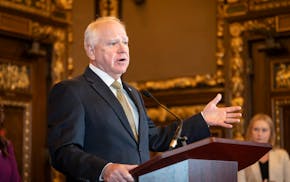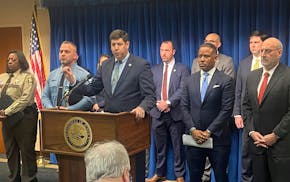More than 600 law enforcement personnel from around the country are convening in Minneapolis this week for a summit that began Monday with applause for the city's recent street gang takedowns and a plea from one national leader for Congress to halt budget cuts for the agency tasked with tracing firearms.
Leaders from all federal law enforcement agencies joined Minneapolis police and other state and local authorities for an annual three-day summit of the National Public Safety Partnership (PSP), a Justice Department training and technical assistance program in its 10th year and which now counts Minneapolis as one of its participants.
"People are looking at what's been accomplished here as a road map for a successful anti-violent crime strategy," U.S. Bureau of Alcohol, Tobacco, Firearms and Explosives Director Steven Dettelbach said in an interview Monday.
Dettelbach returned to Minneapolis Monday after joining U.S. Attorney Andrew Luger to announce federal racketeering charges against members of a prominent street gang last year. To date, the federal gang focus has yielded more than 100 charges — including winning an October conviction in the first racketeering case to go to trial.
Monday's PSP summit kicked off with a heavy focus on Minneapolis' federal gang crackdown — which required partnerships between federal, state and local agencies to pull off. Luger and Minneapolis Police Chief Brian O'Hara were also scheduled to lead a panel on their strategy as part of the classes open only to law enforcement attending the event.
"We went from a city where violent crime was never the topic of conversation to a city in which violent crime is the topic of conversation," Luger said in his opening remarks Monday.
Luger, who told the Star Tribune that he plans to resign before President-elect Donald Trump's Jan. 20 inauguration, on Monday emphasized what Minnesota law enforcement has been able to accomplish while working together. Speaking to reporters later Monday morning, Luger raised as an example the February killings of three Burnsville first responders, which within weeks led to straw purchasing charges against the girlfriend of the shooter thanks to gun tracing.
Last year, the city of Minneapolis became one of 67 cities to participate in the PSP program. The partnership typically requires a three-year commitment, and O'Hara on Monday told reporters the city has so far tapped the program for training on shootings as well as help improving how the department tracks and responds to crime. O'Hara said the department will again seek federal funding to help establish a "real-time crime center" that could help with processing evidence backlogs and assist in investigations.
Dettelbach began Monday by imploring the room to make the case in their respective corners of the country for Congress not to slash ATF's budget further next year. He said Congress cut the bureau's budget by $50 million last year and he has since heard talk of a far steeper cut next year.
"That will mean that we will not be able to provide the services to you, our partners that we want to. We're a small agency. We can't take that kind of cut without talking about closing down whole areas of operations in this country."
Dettelbach hailed the ATF's gun tracing and ballistics investigation programs. The latter, he said, helped generate 200,000 leads for police around the country in 2023. Also last year, Dettelbach said, agents traced 645,000 guns used in crimes. Agents can turn around emergency trace requests as quickly as within a half-hour, Dettelbach said, such as the firearm used in the July attempted assassination of Trump during a Pennsylvania rally.
Dettelbach later said in an interview new firearms trafficking and straw purchasing statutes passed as part of the Bipartisan Safer Communities Act in 2022 have led to more than 1,000 new charges.
Dettelbach and others Monday credited programs such as the PSP with helping drive down violent crime in many corners of the country in the past year. While O'Hara said Minneapolis recently exceeded its 2023 homicide total, overall shootings are trending downward in the city this year.
"Our partnerships in the gang cases, working those in concert with the U.S. Attorney's Office, we are looking to make an impact and you can already see the fruits of our labor," added Alvin Winston, special agent in charge of the FBI's Minneapolis division, in an interview Monday.

Accomplished climber, photographer who recently moved from St. Paul missing on mountain

Walz: State had no advance notice of federal raid in Minneapolis

DOGE cuts federal money for upgrades at Velveeta plant in New Ulm

Five members of Minneapolis Highs street gang found guilty of racketeering conspiracy
